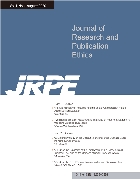 E-ISSN : 2733-7146
E-ISSN : 2733-7146
Vol.2 No.2
Abstract
Purpose: Ethical behaviors become more salient when researchers utilize face-to-face interviews and observation with vulnerable groups or communities, which may be unable to express their emotions during the sessions. The present research aims to investigate ethical behaviors while conducting research have resonance due to the deep nature of observation and interview data collection methods. Research design, data and methodology: The present research obtained non-numeric (Textual) data based on prior literature review to investigate Ethical Conducts in Qualitative Research. Non-numeric data differs from numeric data in how the data is collected, analyzed and presented. It is important to formulate written questions and adopt them what the method claims for the researcher to understand the studied phenomenon. Results: Our findings show that while conducting qualitative research, researchers must adhere to the following ethical conducts; upholding informed consent, confidentiality and privacy, adhering to beneficence's principle, practicing honesty and integrity. Each ethical conduct is discoursed in detail to realize more information on how it impacts the researcher and research participants. Conclusions: The current authors concludes that five ethical conducts are important for realizing extensive and rich information during qualitative research and may be exploited in implementing research policies for researchers utilizing observation and interviews methods of data collection.
Abstract
Purpose: The purpose of this study is to analyze the research trends of domestic research ethics and to draw implications for the limitations of existing research and future development directions through this. Research design, data and methodology: To this end, this study first examined the concept of research ethics and research area to derive an analysis frame. In addition, 72 academic papers published in domestic journals from 2000 to November 2020 were analyzed according to the research period, research area, research subject, research field, research method, and the nature of the journal. Results: As a result of the analysis, it is judged that social interest in research ethics led to academic interest after the 2005 Hwang Woo-seok incident. These characteristics show that the interest of academia is changing and increasing significantly when issues related to research ethics are raised socially. Of the 72 papers to be analyzed, 29 (40.3%) conceptual and theoretical studies on research ethics and 43 (59.7%) studies on practical measures were surveyed. Conclusions: In the case of published journals on research ethics, the proportion of publications in humanities and social sciences and pedagogical journals was high, and in research methods, literature and theoretical studies were the highest.
Abstract
Purpose: This paper is to review and analyze development strategy of the East Asian Journal of Business Economics and to look at the previous and current changed publication system and process in order to step up the article quality of EAJBE. Research design, data and methodology: This study grasped the current status and strategy of this journal through literature review. In addition, through the case of EAJBE, the internationalization strategy and research ethics policy of this journal were analyzed. Results: EAJBE clarifies the copyright delegation procedure of the final publication paper. Regarding compliance with research ethics, Editor-in-Chief and Management Editor are completing research ethics training. From 2017 to the present, Editor-in-Chief and Management Editor have completed online ethics training and hold certificates of completion. Conclusions: EAJBE specifies the rules for exclusion of examination by the contributor and the examiner belonging to the same institution and actually operates in this way. Currently, by using the Jams system, the plagiarism verification procedure is operated using the thesis plagiarism prevention system. Finally, in order to strengthen research ethics standards, EAJBE is trying to establish and strengthen a verification system for each paper using the system of the Korea Research Foundation, not the previous foreign paid plagiarism system.
Abstract
Purpose: This paper aims to evaluate and reinstate preventative guidelines necessary for a sound academic journal (or academic conference) for the articles published by KODISA and its branch journals. As questionable or predatory academic journals and academic conferences are rapidly increasing, preemptively establishing preventative standards have become essential to obviate questionable academic activities. Research design, data and methodology: This is an analytical study that explores and examines research, publication ethics, and misconducts. For this purpose, research ethics related data in overseas and domestic academic journals have been examined and analyzed. Results: The issues identified from this research are as follows: enhancing the expertise of editor-inchief (no concurrent jobs for major and non-major area); clarifying the index; complying with the review policy (The review policy should be publicly announced); complying with anonymous review process; complying with 3 peer-review policy, complying with the publication policy as per field of study; avoiding conference hosting at holiday resorts unless unavoidable; complying with the planned programs and cancelling events if not feasible; following proper review standards and management for all journals, including the journals publishing large number of articles (all materials should be prepared in case explanatory data is required); complying with the marketing policy standards; complying with the impact factor; excluding personal solicitation; and complying with the general policy. Conclusions: Questionable and predatory academic activities by academic organizations and journals will continue, and it is the responsibility of the individual scholars to identify and reject these types of dubious academic activities. This study provides standards to prevent the possibility of questionable academic activities that have been conducted in the past. The analysis and findings will strengthen the continued efforts of KODISA as it strives to be a transparent, ethical, and professional academic association, and the association will continue to foster an academic environment that is well-respected by scholars and practitioners throughout the world.













